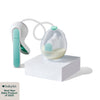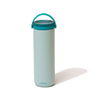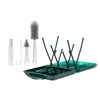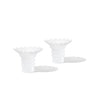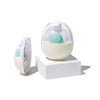When you hear birth trauma, what do you think of?
Your mind probably races to any scene of an emergency birth on a medical drama. There’s lots of screaming, sweating, danger, you name it. The epitome of trauma.
Did you know that birth trauma comes in a variety? What might seem normal and calm may still be traumatic.
What Counts as a Birth Trauma?
Birth traumas are some of the most under discussed phases of the pregnancy journey. The common belief is as long as you and your baby are healthy, you should be able to move on. But we see you.
The fact of the matter is if you are feeling negatively emotional or unsettled about your birth, that is valid. Now, with that being said, let’s walk through two different birth experiences from some of our Willow moms:
Birth #1: “I was induced at 39 weeks due to continued concerns with my baby’s blood pressure. Really, I think the doctors were tired of seeing me. They always told me that I was just a first-time mom who was worried for no reason.
When they placed my daughter on my chest I noticed some blueness around her nose and lips but was told it was normal. I was constantly told I was overreacting. When the pediatrician came in the next morning, she expressed concern about a murmur they could hear in my daughter’s heart. After taking her for a test, the head of Cardiology came to tell us our baby had a heart defect. Everything we had been concerned about was real.”
Birth #2: “I went to the OBGYN for a routine appointment at 37 weeks and was told I was in active labor. I had to be rushed to labor and delivery where they discovered that my daughter was breech. My midwife insisted that we could do an external procedure to flip the baby around but there was no guarantee it would work.
We went into the operating room to do the external procedure which no one explained would hurt as much as it did. They made my husband wait outside during it and no one was available to help talk me through it.
Without explanation, I was taken back to the labor and delivery room. The procedure had worked but no one had taken the time to tell me.
I was able to get an epidural and calmly deliver my daughter, safely for both of us. But there is just something I cannot shake about that experience."
Let’s Talk About It
So, which of those births seems “worse”?
There is no right answer. Each birth came with its own unique challenges, traumas, and could have a lasting impact on all those involved.
Trauma doesn’t follow a textbook checklist. There are so many factors that can lead to a traumatic birth, including:
- Not feeling heard
- Feeling bullied
- Being in physical danger
- Complications
How Does Birth Trauma Affect My Baby?
Birth trauma does not always just affect the mother. Due to the intense emotional and physical toll birthing can have, there are times when the body just shuts down, leaving the mother numb or completely exhausted.
Situations like these present an opportunity for feeding challenges and bonding difficulties to enter. Now, please do not think that just because you have a traumatic birth you will ultimately be unable to bond with your baby or be unable to breastfeed. That is not the case!
In order to keep true to your wishes for what to do in this situation, consider talking this through with your birthing support people ahead of time. Think, “what do I want to be done to encourage bonding and feeding of my baby if I am unable to physically help?”.
Having a clear plan discussed, and even documented, can help empower you and your birthing partner(s) to stay true to what you deem best for you and your baby.
Breastfeeding Difficulties After Traumatic Birth
Breastfeeding can be exhausting whether you have a traumatic birth or not. To best prepare you for what is ahead, please take the time to read up on what you can expect when starting to breastfeed.
Following a traumatic birth, there is a higher chance that the typical cadence of breastfeeding will be skipped. This could lead to your baby struggling to latch or your milk supply not coming in fully.
While breastfeeding is a natural thing, there is a learning curve to it! Learning how to establish breastfeeding and milk supply can feel the same as trying to solve string theory – impossible without multiple advanced degrees.
Look, we get it. There is just too much information out there. It can feel impossible to trust anyone! Hopefully, by now, we have earned some of your trust.
To prove it, we have created a deep pool of resources on our blog that will help guide you through every step of your pregnancy and postpartum journeys.
Will I Ever Get Over My Traumatic Birth
Yes – but not without working at it.
The reality is, your birth is not something you can change, as much as you may want to. Being able to fully process, and perhaps even grieve, the birth you had is only going to help you move forward.
One of the first steps in coming to terms with a traumatic birth is to accept what is. There may be people telling you that you shouldn’t be upset because you have a happy, healthy baby.
Ignore them.
Find an outlet for your emotions, whether it’s journaling or walking in a beautiful place. Lean on the people you trust and allow them to help you navigate the feelings you are having.
If you reach a point where the upset is too great to handle on your own, always know you can turn to your OB/GYN or midwife for resources and support groups.
Take Control Over Your Breastfeeding Journey with Willow
While you cannot control your birth, you can control your breastfeeding journey (to an extent).
Choosing a breast pump is a personal decision, based on a variety of factors. You need to make the decision that is going to best suit your life and your needs.
Willow pumps are designed for moms, no matter how many kids you have! Now, we could go on and on about the fully in-bra design and quiet motor that allows you to pump discreetly, but where is the fun in that? Come see what sets us apart and decide for yourself.
We are here for you, every step of the way!


